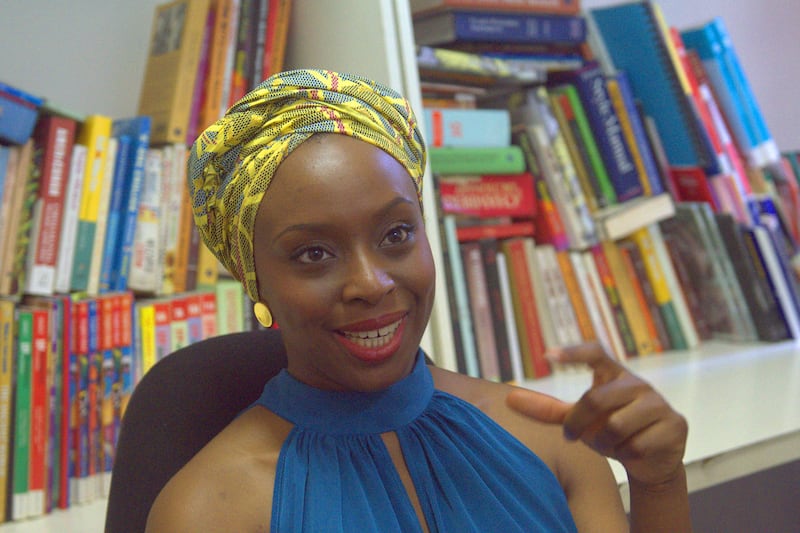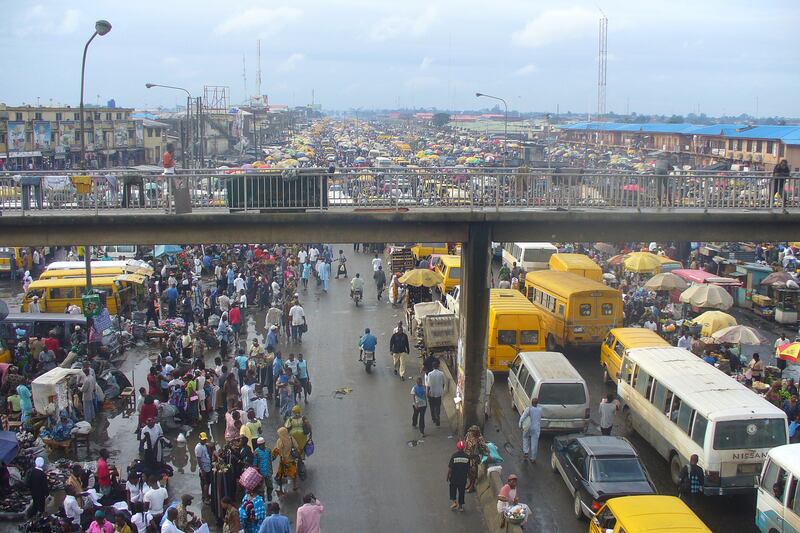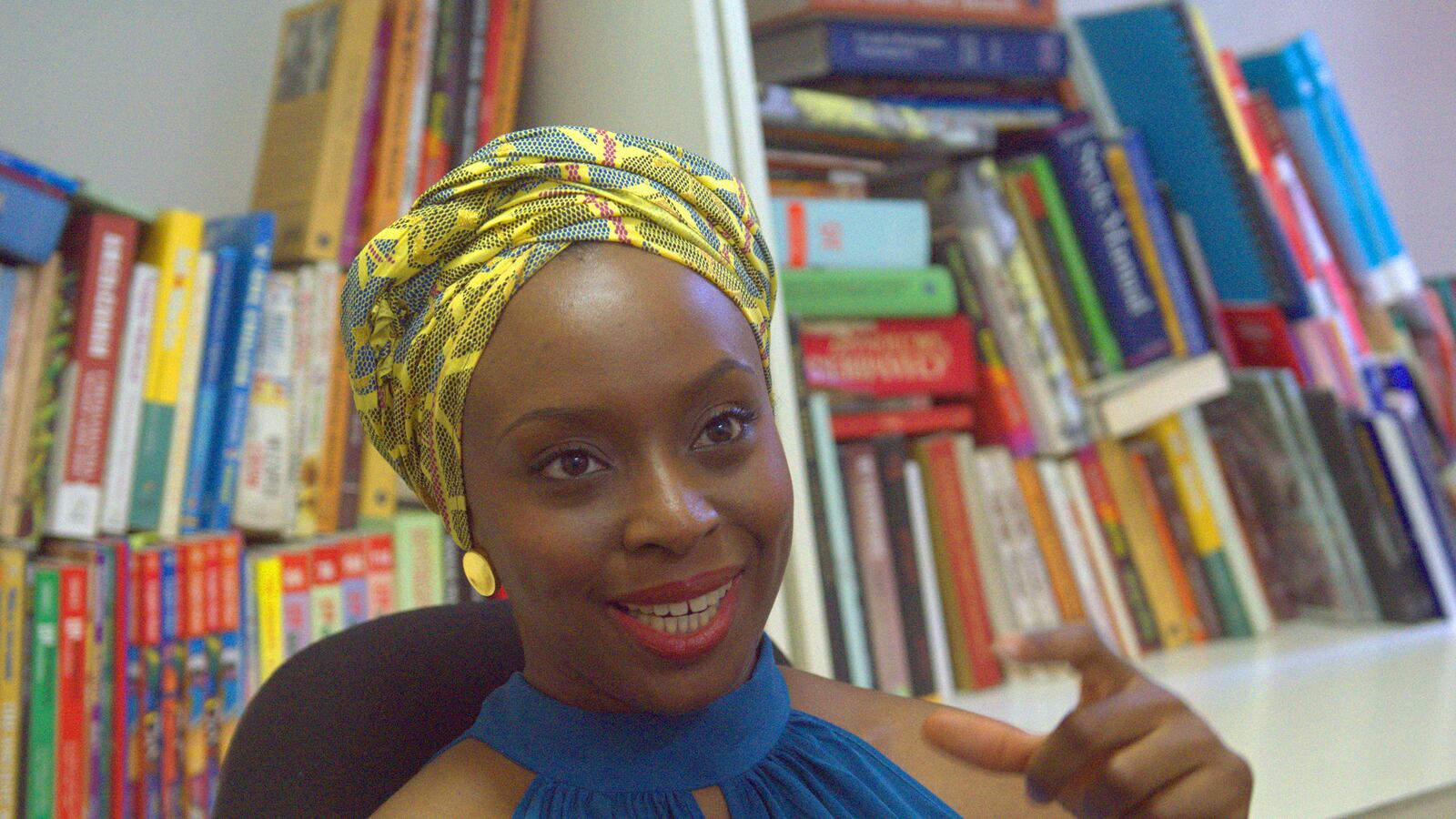Chimamanda Ngozi Adichie has been a cornerstone of both Nigerian and American literature in recent years. Her debut novel, Half of a Yellow Sun was followed by a MacArthur Fellowship in 2008 and her latest, Americanah, which describes a young couple reintegrating back into Nigerian life after an American education has just won the National Book Critics Circle Award for fiction.

Growing up in a quiet area of Enugu with her Igbo family—an ethnicity and language that many of her characters share—Adichie left Nigeria to study in the U.S. at the age of 19 and now spends half a year in each country, teaching creative writing at the University of Lagos. She’s also penned a collection of short stories, as well as essays on a variety of political and social issues, (her Ted Talk “We Should all be Feminists” was sampled by Beyoncé) which have led to her publication in over 30 languages.
Here, the novelist speaks about her favorite Lagosian haunts, leading a “happily boring” life and the short stories that come out of traffic jams.
Can you describe the area of Lagos you live in?
I always feel that one can find anything at all in Lagos, you need only to know where to look. Lagos has an unplanned-ness to it, houses spring up everywhere like weeds, roads and streets interweave. It is not a pretty city, in the conventional western understanding of a pretty city, and it does not want or aspire to be. Traffic is a recurring motif: on weekdays the roads are full of cars, and Lagosians make their plans around traffic - they delay trips or leave very early to avoid the worst of the traffic. It is a city full of dreams and distrust, Lagosians have big dreams and big ambitions, and the first instinct of a Lagosian is to distrust the next person and the next person's motivation. And yet it is a city full of kindness and warmth - I've seen people help elderly strangers carrying heavy bags, give stranded strangers a lift, go out of their way to give directions to a lost driver. The air in Lagos is one of striving, of hustling and it is a city that very easily leaves you behind.
Is there anywhere particular you find yourself returning to in the city?
I like Jazzhole, which is a lovely, music-savvy bookshop on Awolowo Road in Ikoyi that has a little cafe in the back. I like to go and browse and buy books and magazines. I also like Terra Kulture, a cultural center in Victoria Island, the restaurant there makes a nice smoothie called 'Go Slow.'

What do you do around Lagos when you're not writing?
I spend time with family and friends. I spend most of my time at home or at my sister's house or at my friends'. My life is quite happily boring. I don't go out much. Lagos has a wonderful night scene, I'm told, but I know little about the clubs and bars. I've never quite understood the point of clubs: choked with noise and smoke and too many people sharing too little space. I go out to eat, though not as much I used to. I like Yellow Chilli in Victoria Island for good Nigerian food and Spice Bowl in Lekki for the spring rolls. I also like the jollof rice and chicken from Chicken Republic, which is a fast food chain dotted all over the city.
I also love to go to the market, mostly to buy fabrics which I then take to my tailor. Balogun market is vibrant, filled with traders who are very smart and very funny and quick with the best quips and come-backs while price bargaining.
What has writing about Lagos done to your relationship with it?
I sometimes think that the person who writes about Lagos is different from the person who lives in it. I sit in traffic and complain about not getting somewhere on time but a part of me also sees and appreciates the great potential for a story: imagining the lives of people stuck in traffic, the lives of the hawkers pressing their goods against car windows…
So do you feel a sense of isolation?
No, I don't. One of the things I love about Lagos is the sense that one can often be alone in Lagos but not feel lonely. The gap between the person who lives in Lagos and the person who writes about Lagos is not about a sense of isolation but about being a writer. The part of me that writes and imagines is always one step removed in every situation, constantly watching and noticing.
Do you think it matters where a writer comes from when considering their ideas? Does the idea of place still exist for a writer?
It's nice to imagine it doesn't but it does. If you are a writer from a country like Nigeria or Pakistan or Sudan or Bangladesh, you are much more likely to be aware of where you come from because you'll have trouble with travel - the process of applying for a visa would itself make a short story. And it belies the idea of the writer as a placeless member of the Society of the Imagination.
You think the imagination is undermined by bureaucracy?
It isn't undermined by it, no. But it is shaped, informed, influenced by it.
Your novel, Americanah deals with people’s reception and subsequent perception once they have left or returned to Nigeria. What is your position within the city now - having also done that?
I didn't grow up in Lagos. I grew up in Nsukka, a university town that was much slower than Lagos. Now that I have a home in Lagos, I still sometimes think of myself as very much a 'small university campus’ person at heart. But I love Lagos, I complain a lot about Lagos, there is much I want to change about Lagos, but it is the number one city I want to live in. London is number two.
What is it you complain about?
I complain to everyone who is willing to listen and to some who are not. I complain, in the way one does of a place one loves, of how things could be better - the roads, the traffic. Lately I have mostly been complaining about how much I have had to spend on diesel to power my generator, because electricity supply has been worse than usual.
Where do you buy the books you read?
Mostly now on kindle, because it's so much easier to read more than one book at the same time. But also Jazzhole and Patabah bookshop in Surulere.
What are the best works of literature set in Lagos?
I love Buchi Emecheta's The Joys Of Motherhood. It is, among other things, a delightful study of working class Lagos under British colonialism
Can you recommend any contemporary writers coming out of Nigeria?
Eghosa Imasuen is the author of Fine Boys, a novel I admire very much. His ability to tell a story that is both nostalgic and immediate. He portrays a certain slice of middle class Nigerian life under the dictatorships of Generals Babangida and Abacha, and in particular writes about the sad and troubling phenomenon of cults - violent gangs in Nigerian universities, peopled by well-brought-up boys who fight and occasionally kill one another.





